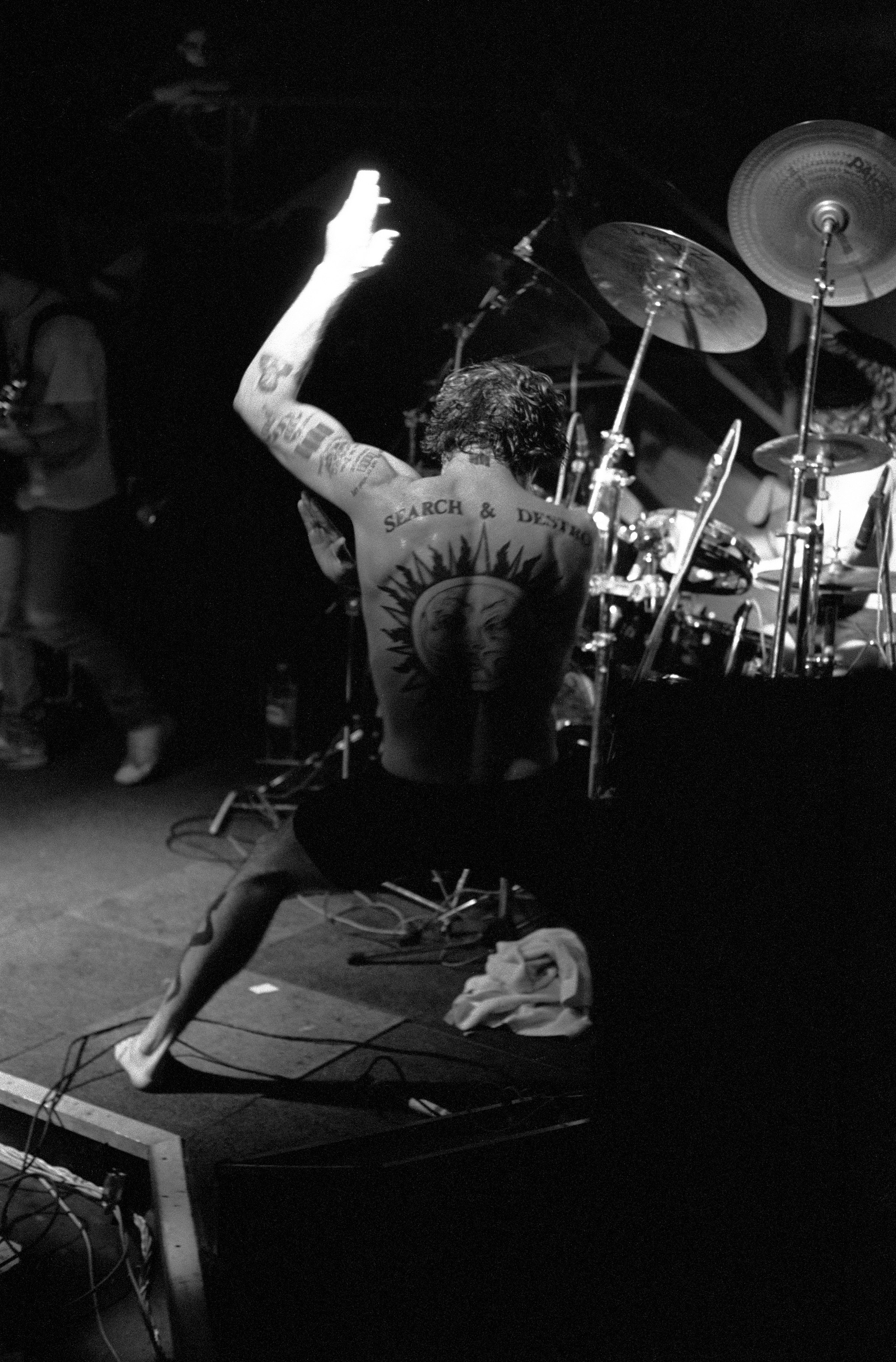The late 1980s was a fascinating period in the history of alternative rock music and one of the most intriguing aspects of this epoch was what you might describe as a ‘culture clash’ between the UK and US post-punk bands of that time.
Between 1987 and 1993 I played bass and sang in a punk band called Nerve Rack. The group was formed in Leeds, a city in the Yorkshire region of the UK that had made a small but significant contribution to punk and post-punk culture. Influential bands such as Gang of Four, Scritti Politti and Mekons had emerged from the higher education music scene there. These bands made scratchy, uncompromising music and wrote lyrics about the socio-political tribulations of the day from a clear Marxist perspective. Nerve Rack was influenced by these bands but also by the radical anarchist leanings of Crass and their independent record label that featured the likes of Rudimentary Peni and Flux of Pink Indians. A few miles from Leeds, in Bradford, an anarchist club had been set up called the ‘1 in 12’ (named after a government investigation into benefit fraud which found that ‘1 in 12’ claimants was actively “defrauding the state”) a venue that showcased punk bands and alternative ways of living. It was time of crumbling unpleasant squats, alcohol and drug misuse and benefit gigs for radical causes (the infamous ‘anti-vivisection jumble sales’, for example).
In 1988 Nerve Rack began to pick up UK support slots with a range of North American post-punk bands that were ploughing a similar furrow but with apparently much greater success. For some reason at this time North American punks wanted to play in Europe and promoters were happy to oblige. At first, my group was delighted with the opportunity to play alongside such luminaries as Fugazi, Jesus Lizard, UT, Naked Raygun and No Means No but it was not long before clear musical and ideological differences began to appear…
It was against this backdrop that the renowned punk singer and writer Henry Rollins set up camp in Leeds. Rollins’ influential band Black Flag had recently split and Rollins was at a loss as to what to do next. One of his old Washington DC friends Chris Haskett was taking a degree at Leeds University and offered to help out, telling Rollins that he could sort out the music (and some musicians) if Rollins could deal with the words. Before Nerve Rack was a serious concern, Rollins had moved to Leeds (to the Hyde Park area of the city) and began rehearsals with what became The Rollins Band. The group recorded at Off Beat studios in the city with producer/engineer Geoff Clout, and undertook a gruelling series of tours. Many of these Leeds recordings subsequently appeared on the Hot Animal Machine, Do It and Life Time releases. For me though, the most memorable of these was the Henrietta Collins and the Wifebeating Childhaters EP for which the group adopted female monikers (Henry Rollins transforming into ‘Henrietta Collins’) and featuring a striking cover shot taken by Joe Cole, Rollins’ close friend who was later shot in the head and killed during an attempted mugging. Rollins found Leeds alienating and stagnant. In Black Coffee Blues he described it as a city that had been “slapped in the face with grey poison”.
On 29 October 1988 The Rollins Band performed at the Tartan Bar at Leeds University (Haskett had become ‘Entertainment Secretary’ for the institution making bookings easier). I attended the show and, as I was an art student at the time, took a series of photographs of the band in action (see pic).
Like most British post-punk bands, we - Nerve Rack - considered ourselves an uncompromising musical outfit. However, as soon as Rollins took to the stage, all such delusions were blasted away. After some jokey introductions taking the piss out of Clout, Rollins morphed into a tour de force of anger and aggression. Dressed only in a tiny pair of black shorts the singer stomped around the stage, declaiming and screaming, his massive ‘Search and Destroy’ tattoo hypnotizing the unruly punks in the crowd. The atmosphere in the small and suffocating bar can be best described as ‘edgy’. We were impressed, but also a little troubled…
Almost exactly a year later, The Rollins Band returned to Leeds and Nerve Rack got the chance to play as support act. Nerve Rack guitarist Doug had actually interviewed Rollins during his Black Flag days for his friend Sean’s punk ‘zine and warned us that he was ‘prickly’. We were wary then, like those fans expecting Rollins to be, as he notes sarcastically in Black Coffee Blues, “a mean son of a bitch”. Alarm bells rang when we arrived at the venue to find the musicians running their sound-check while Rollins performed a series of gruelling push-ups in the middle of the empty dance floor. The Rollins Band seemed to take an eternity to get ready. There was a third band in the line-up also waiting by the side of the stage; the clock was ticking and the doors were about to open. Eventually, Doug plucked up the courage to politely ask Rollins when it would be our turn to set up. “Don’t worry” said Rollins, “We’re sound-checking for all the bands”.
We had encountered the ‘professionalism’ of American punk groups before and were somewhat startled to learn that while the UK bands approached their music with a degree of nonchalance, the Americans were tightly drilled units. They were practiced, highly organised and enjoyed, behind the radical image, an impressive protestant work ethic. I was reminded of the time when Alice Donut joined our line-up in Manchester (at the last minute, after their Liverpool gig was cancelled) and graciously insisted that they played first, only to blow the rest of the bands completely off the stage. Rollins, with his physical training and stand-up/prose writer’s discipline, seemed to typify this attitude. Our amateurism was cruelly exposed.
The other thing that bothered us about the American bands, and Rollins in particular, was a somewhat ‘macho’ approach to punk rock. The UK anarchist tradition, while often violent, was pacifist in nature. For example, punk writer and leader of The Membranes John Robb, writing in Sounds, described Nerve Rack’s performance as “a spindle-armed assault”. In other words, we were raucous…but weedy. This could not be said of Rollins. We found the crude violence expressed in Rollins’ music, and that of other uncompromising US post-punk such as Big Black – graphically recounting shootings, ODs, rapes and other degradations - profoundly upsetting. We were not alone in this either. Rollins’ appearance on the UK TV show The Word, was interrupted when feminist punk band Huggy Bear, part of the Riot grrrl movement, heckled and jeered him. When we came to record our first LP at the same Leeds studio that The Rollins Band used, we included a song called ‘Abrasive Material’ that critiqued the Rollins style of macho expression. To ram the point home it even incorporated (I’m ashamed to say now) a passage lifted directly from ‘Drive-by Shooting’ from the Henrietta Collins EP. Naturally, this was done in a cowardly manner, Rollins being by then thousands of miles away back in the US.
The ‘macho’ style no doubt reflected a more violent culture, where the hated forces of the establishment were a real and credible physical threat, but it seemed to clash with the anti-proliferation/feminist politics then being absorbed by the European anarchist punk scene, a stance that had been part of the punk scene since the days of Poly Styrene and The Slits. Since the days of Black Flag’s UK tours, Rollins had experienced this cultural dissonance, the American bands’ hardcore energy rubbing up against against the slovenly disorder of what drummer Mick Green aptly described as “the last farts of English punk”. Such ‘culture clashes’ could be real or could be imagined, the product of hazy memories and confused times.
Since then I have come to understand that Henry Rollins is one of the ‘good guys’. The last time I saw him was in 2019 on a panel made up of ‘punk legends’ at the launch of the Epix network’s ‘docuseries’ on the genre. The sole Brit on the panel was John Lydon who was extremely drunk and set about abusing all the other members, talking over them and claiming, somewhat ludicrously, that he was the only true punk visionary. It was excruciating stuff and when he told Rollins directly that Black Flag’s music was “fucking boring” I held my breath expecting Rollins to stick one on him. Instead, he just shrugged and smiled, professional to the last. Perhaps all along the Brit punks were the real thugs?
With thanks to Mick Green, Jeff Brown and Doug Aikman for their help with this article.
Mark Goodall is a writer and filmmaker. He is the author of Sweet and Savage a book about mondo films, and Gathering of the Tribe about music and the occult (both published by Headpress). He co-produced and directed the film Holy Terrors based on the stories of Arthur Machen. He is currently singer/guitarist with the group Rudolf Rocker.


